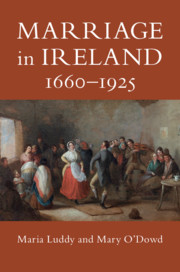Book contents
- Marriage in Ireland, 1660–1925
- Marriage in Ireland, 1660–1925
- Copyright page
- Dedication
- Contents
- Figures
- Illustrations
- Tables
- Acknowledgements
- Abbreviations
- Introduction
- Part I What Is a Marriage?
- Part II Ways to Marriage
- Part III Happy Ever After?
- 7 Marital Relations
- 8 Adultery and Sex outside Marriage
- 9 Bigamy
- Part IV The Unmaking of Marriage
- Conclusion
- Select Bibliography
- Index
9 - Bigamy
from Part III - Happy Ever After?
Published online by Cambridge University Press: 04 June 2020
- Marriage in Ireland, 1660–1925
- Marriage in Ireland, 1660–1925
- Copyright page
- Dedication
- Contents
- Figures
- Illustrations
- Tables
- Acknowledgements
- Abbreviations
- Introduction
- Part I What Is a Marriage?
- Part II Ways to Marriage
- Part III Happy Ever After?
- 7 Marital Relations
- 8 Adultery and Sex outside Marriage
- 9 Bigamy
- Part IV The Unmaking of Marriage
- Conclusion
- Select Bibliography
- Index
Summary
The ecclesiastical authorities in the Catholic and Presbyterian churches imposed penalties on members of their congregations who violated their respective institution’s regulations on bigamy and remarriage.Bigamy was, from 1634, a criminal offence which was prosecuted in the civil rather than the ecclesiastical courts. An individual who wished to invalidate a marriage in civil law on the grounds of bigamy was obliged to seek a solution in the civil courts.The destruction of court records means that we have little information on rates of bigamy in Ireland before the nineteenth century.Bigamy cases generally involved desertion and abandonment, states with practical and emotional consequences that must have been difficult for those who were deserted and for second spouses who must, in some cases at least, have also felt betrayed.The men and women who committed bigamy were on the whole servants, porters, labourers, soldiers and sailors.The majority were not improving their economic state, but perhaps tried instead to find some happiness in their lives. Bigamy pretended a marriage and thus respectability existed, and may have been preferable to open cohabitation. Bigamy reveals that over the period there was an amount of marital non-conformity, men and women interpreted the law on marriage flexibly to suit their own ends.
Keywords
- Type
- Chapter
- Information
- Marriage in Ireland, 1660–1925 , pp. 283 - 308Publisher: Cambridge University PressPrint publication year: 2020

